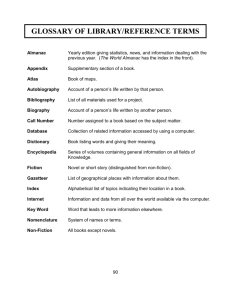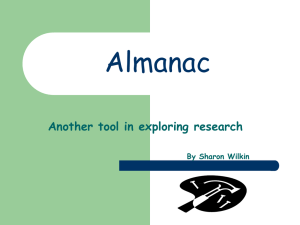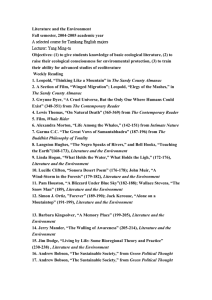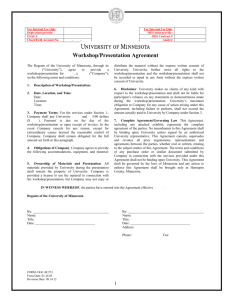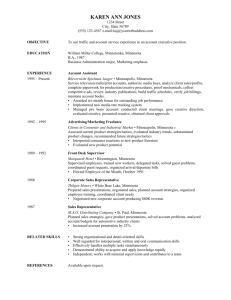this feature to print - Sound Learning
advertisement
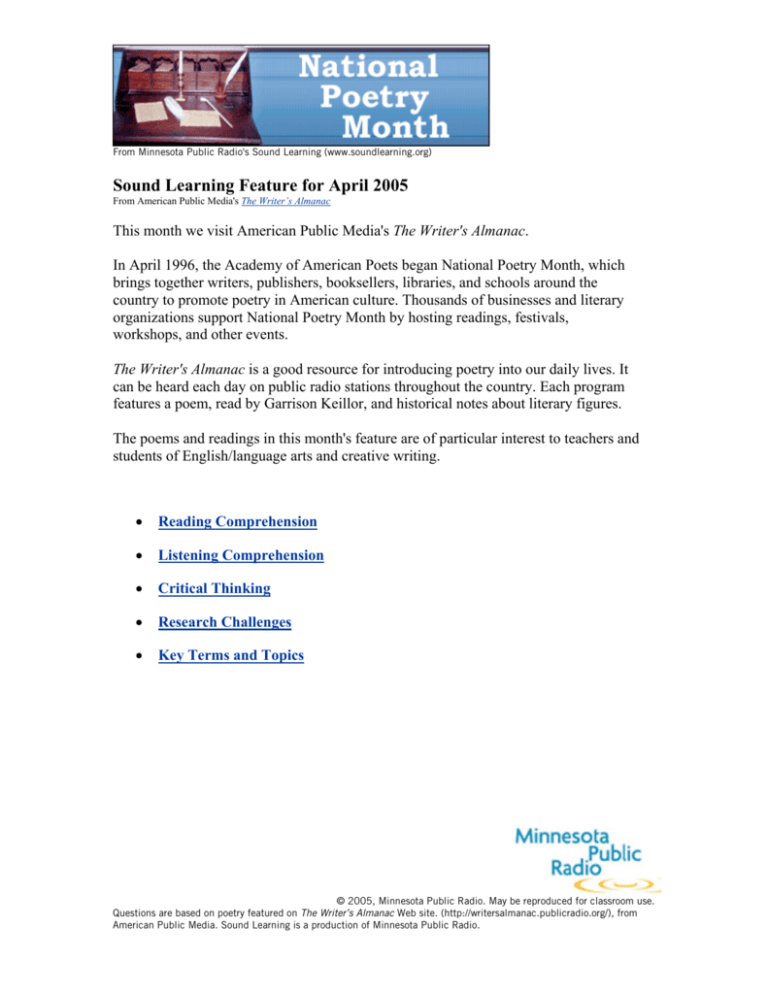
From Minnesota Public Radio's Sound Learning (www.soundlearning.org) Sound Learning Feature for April 2005 From American Public Media's The Writer’s Almanac This month we visit American Public Media's The Writer's Almanac. In April 1996, the Academy of American Poets began National Poetry Month, which brings together writers, publishers, booksellers, libraries, and schools around the country to promote poetry in American culture. Thousands of businesses and literary organizations support National Poetry Month by hosting readings, festivals, workshops, and other events. The Writer's Almanac is a good resource for introducing poetry into our daily lives. It can be heard each day on public radio stations throughout the country. Each program features a poem, read by Garrison Keillor, and historical notes about literary figures. The poems and readings in this month's feature are of particular interest to teachers and students of English/language arts and creative writing. • Reading Comprehension • Listening Comprehension • Critical Thinking • Research Challenges • Key Terms and Topics © 2005, Minnesota Public Radio. May be reproduced for classroom use. Questions are based on poetry featured on The Writer’s Almanac Web site. (http://writersalmanac.publicradio.org/), from American Public Media. Sound Learning is a production of Minnesota Public Radio. From Minnesota Public Radio's Sound Learning (www.soundlearning.org) All poems in this segment are available to read, or to listen to in the "Featured Resources" section on the Sound Learning Web site. Reading Comprehension Read the following poems on the Writer's Almanac Web site. After you have read them, answer the questions below. "Riding Lesson" by Henry Taylor (http://writersalmanac.publicradio.org/docs/02_10_28.htm#tuesday) "The Lesson" by Edward Lucie-Smith (http://writersalmanac.publicradio.org/docs/01_03_05.htm#WEDNESDAY) "What Happened When Bobby Jack Cockrum..." by David Lee (http://writersalmanac.publicradio.org/docs/01_09_03.htm#wednesday) "Latin" by Anonymous (http://writersalmanac.publicradio.org/docs/02_06_24.htm#wednesday) Answer the following questions: 1. Two lessons are identified in "Riding Lesson." What are these lessons? 2. How do animals act as teachers in "Riding Lesson" and "What Happened..."? 3. In "Latin" why does the narrator consider the dead lucky? 4. In "The Lesson" what does the line "Could bind the bully's fist for a week or two;" suggest about the narrator's experience in school? 5. In "The Lesson" what lesson does the title refer to? © 2005, Minnesota Public Radio. May be reproduced for classroom use. Questions are based on poetry featured on The Writer’s Almanac Web site. (http://writersalmanac.publicradio.org/), from American Public Media. Sound Learning is a production of Minnesota Public Radio. From Minnesota Public Radio's Sound Learning (www.soundlearning.org) Listening Comprehension Listen to the following poems from the Writer's Almanac Web site. After you have read them, answer the questions below. "Alphabet" by R.T. Smith (http://www.publicradio.org/tools/media/player/almanac/writersalmanac_archive/0206 24/020624?&start=00:00:36:18.0&end=00:00:38:04.0) "Criss Cross Apple Sauce," by Thomas Lux (http://www.publicradio.org/tools/media/player/almanac/writersalmanac_archive/0103 05/010309?&start=00:00:03:16.0&end=00:00:04:38.3) "In Second Grade Miss Lee I Promised Never to Forget You And I Never Did," by Alberto Rios (http://www.publicradio.org/tools/media/player/almanac/2005/04/04_wa?start=00:00:0 7:05.3&end=00:00:08:25.3) Answer the following questions: 1. In "Alphabet" identify four objects described by the narrator. 2. Which line in "Alphabet" suggests the narrator's motivation for working on his letters for an hour? 3. In "Latin" why does the narrator consider the dead lucky? 4. What is the 'letting-go moment' described in "In Second Grade Miss Lee..."? 5. In "The Lesson" what lesson does the title refer to? Critical Thinking Read the following poems on the Writer's Almanac Web site. After you have read them, answer the questions below. "To David, About His Education" by Howard Nemerov (http://writersalmanac.publicradio.org/docs/04_03_01.htm#wednesday) "First Lesson" by Philip Booth © 2005, Minnesota Public Radio. May be reproduced for classroom use. Questions are based on poetry featured on The Writer’s Almanac Web site. (http://writersalmanac.publicradio.org/), from American Public Media. Sound Learning is a production of Minnesota Public Radio. From Minnesota Public Radio's Sound Learning (www.soundlearning.org) (http://writersalmanac.publicradio.org/docs/02_02_25.htm#saturday) "The Summer-Camp Bus Pulls Away from the Curb" by Sharon Olds (http://writersalmanac.publicradio.org/docs/03_06_23.htm#wednesday) Answer the following questions: 1. What does the author's tone in "To David, About His Education" suggest about his attitudes toward formal education? 2. Parents are the narrators of "First Lesson" and "The Summer-Camp Bus…" Which parent is more hopeful for their child, and why? Which parent is not? What lines in each poem lead you to these conclusions? 3. Identify some examples of the absurd in "To David, About His Education." What does the author suggest through these examples. 4. How does the final image in each poem reflect the parents' assumptions and impact the poems' statements? Research Challenges Read the following poems on the Writer's Almanac Web site. After you have read them, answer the questions below. "The History Teacher" by Billy Collins (http://writersalmanac.publicradio.org/docs/02_03_11.htm#tuesday) "History Books" by Thomas Lux (http://writersalmanac.publicradio.org/docs/02_03_11.htm#thursday) Answer the following questions: © 2005, Minnesota Public Radio. May be reproduced for classroom use. Questions are based on poetry featured on The Writer’s Almanac Web site. (http://writersalmanac.publicradio.org/), from American Public Media. Sound Learning is a production of Minnesota Public Radio. From Minnesota Public Radio's Sound Learning (www.soundlearning.org) 1. Find "The History Teacher" by Billy Collins on the Writer's Almanac website. Research the historical allusions in the poem, and explain their ironic interpretation and use in the poem. 2. Return to Question 3 in the Critical Thinking portion. In "To David, About His Education," who is Byron? What are Plato's Republic and the Diet of Worms? Explain the absurd juxtapositions in each line. 3. Research biographical information about Howard Nemerov, Sharon Olds, and Philip Booth. Identify incidents/experiences in the poets' lives that may be reflected in the poems you read. 4. Find other poems by Sharon Olds and explain the challenges of childhood she explores in her work. 5. Locate the poem "History Books" by Thomas Lux. Compare his view of war to those of Wilfred Owen, Siegfried Sassoon, and Steven Crane. Key Terms and Topics Terms The following words can be found in the poems referred to in the previous sections. • Chlorine • Narcotic • Pulsating • Hallucination • Amnesia • Chagall • Panpipes • Moors © 2005, Minnesota Public Radio. May be reproduced for classroom use. Questions are based on poetry featured on The Writer’s Almanac Web site. (http://writersalmanac.publicradio.org/), from American Public Media. Sound Learning is a production of Minnesota Public Radio. From Minnesota Public Radio's Sound Learning (www.soundlearning.org) • Reluctant • Unfurling • Mind's eye • Gravely • Deadman's float • Tidewater • Ebb • Light-year • Rancid • Carrion • Ubiquitous • Banal • Redolent • Ditto • Malodor • Anise • Offal • Pheromones • Atavistic • Sculled • Mail order © 2005, Minnesota Public Radio. May be reproduced for classroom use. Questions are based on poetry featured on The Writer’s Almanac Web site. (http://writersalmanac.publicradio.org/), from American Public Media. Sound Learning is a production of Minnesota Public Radio. From Minnesota Public Radio's Sound Learning (www.soundlearning.org) • Zinnias • Flourish • Disciplined • Serifs © 2005, Minnesota Public Radio. May be reproduced for classroom use. Questions are based on poetry featured on The Writer’s Almanac Web site. (http://writersalmanac.publicradio.org/), from American Public Media. Sound Learning is a production of Minnesota Public Radio.
